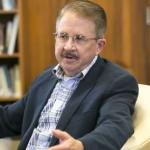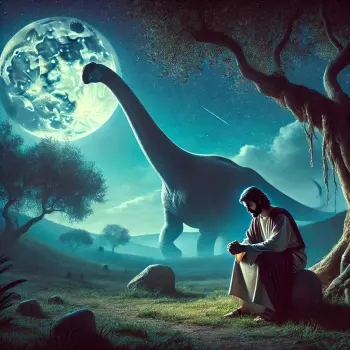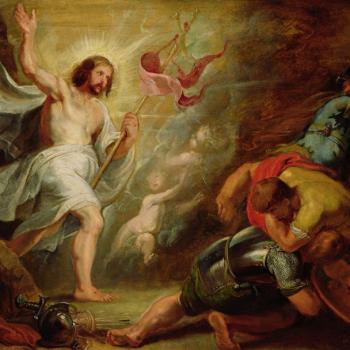The God Question in Cosmic History
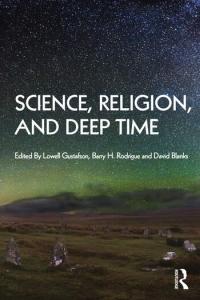
If Big History will not ask the God question, perhaps we should turn to Cosmic History.
In a previous post I contended that the task of Big History should include chronicling and interpreting leaps in consciousness, especially the leap recorded when our ancestors crossed the Axial Threshold. The Axial Threshold asked the God question in the form we still ask today. Unfortunately, such leaps in human consciousness are not as central to practicing big historians as I would like to see.
That’s why I prefer the term, cosmic history. Consciousness thinks about the cosmos, even creates the idea of the cosmos. Within cosmic history, we can include in our story accounts of consciousness of consciousness right along with experiences with transcendence. Then we can ask: what does this all mean?
As I peviously mentioned, an Axial Threshold was crossed somewhere between 800 and 200 BCE. Our ancestors asked the God question in a way that rejected superstitious belief in polytheism and introduced the dramatic dimension of transcendence. The Axial Age now belongs to our history. And to our identity as Homo sapiens. So, let’s ask the God question too.
I ask the God question in my contribution to Big History, God in Cosmic History. Let’s retrace this route.
Crossing the Axial Threshold in Big History
History as the chronicle of contingent events includes reports of an Axial Threshold wherein answers to questions of ultimacy and transcendence were proposed. Pre-axial religious worldviews included gods and goddesses. A constellation of gods and goddesses along with nature spirits became the way the cosmos looked to foragers, farmers, and early villagers. When crossing this agricultural threshold, our ancestors formulated their worldview with mythical and narrative symbolism. Paleontologists find prehistoric evidence that describes this situation after the most recent ice age about ten thousand years ago.
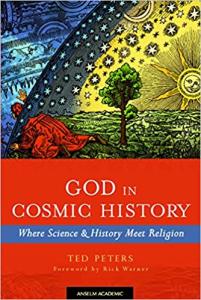
Things changed with the rise of city states and the axial breakthrough in the first millennium before the common era. Post-axial religious traditions–Taoism, Confucianism, Hinduism, Buddhism, Judaism, Christianity, Islam, and others—initiated a leap in human consciousness. Not only did this leap include an awareness of awareness, it also confronted the shock of transcendence. This shock raised the God question in a way that differs from the religious symbols of earlier epochs.
I stress that this is a God question. The God question has different historical answers. Buddhists asked the God question and answered negatively: ultimately, there is no God. Hebrews, Christians, and Muslims answered the God question positively: the God of Israel is singular, ultimate, and universal. Hindus answered the God question with a combination of pantheism and polytheism. The point is this: when our ancestors crossed the Axial Threshold, they experienced transcendence in such a way they felt they needed to ask the question of ultimate reality.
Because our axial ancestors asked the God question, this question should become a topic for historical study. “The human idea of God has a history,” observes religious scholar Karen Armstrong; “since it has always meant something slightly different to each group of people who have used it at various points of time” (Armstrong, 1993, p. xx). What happened over a few centuries in widely dispersed areas of the world just might constitute a contingent historical event – the axial event — with serious meaning.
The Rational and the Mystical
The axial insight into transcendent reality comes in two forms, the rational and the mystical. In its rational mode, axial thinking breaks with prior mythical and narrative thinking. The human mind, according to some axial thinkers, is attuned via reason to that which comes to the world from beyond the world.
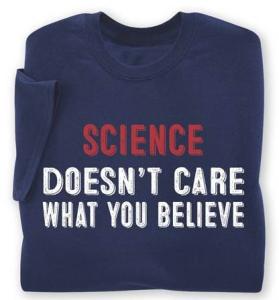
The mystical form includes an inner experience of a reality which transcends human thought but includes human thought. The mystical experience of transcendence is a diapasion in which consciousness feels drawn up into the grand harmony of the spheres.
This mystical experience includes a pre-thematized sense of oneness, the unity of subject and object, a cosmic unity that comes from beyond the cosmos. “Human experience of transcendence has been a fact of life,” says Armstrong (Armstrong, 1993, p. xxi). Therefore, it should be included among the topics historians chronicle.
The prophetic variant in the Bible is a form of the mystical mode. But what distinguishes biblical prophecy from other mysticism is the Word of God uttered by the prophet that renders judgment and promise regarding social events. The divine Word mediates the mystical reality.
In both rational and mystical forms, the axial insight reports a primary ultimacy which transcends the cosmic reality in which our daily life takes place. These axial claims need to be re-thought, so to speak, by the cosmic historian who wishes to ask the God question. Yesterday’s axial answer becomes today’s question.
What is the ground of history?
There is an additional mode in which the God question arises for history. The God question arises when one asks: what is the ground of history? What is history’s foundation? Does history ground itself? Or does it require something beyond history? Is history grounded in the contingency of natural events? Is history grounded in the freedom of human events? Does history constitute the final reality? Or does history nest within a more ultimate reality?
In order to pursue the God question in this second mode, one will have to interrogate history. One will have to give history a cross examination, so to speak. Such a cross examination could only come from critical consciousness, from a willingness to question assumptions and draw out implications.
Re-asking the God question
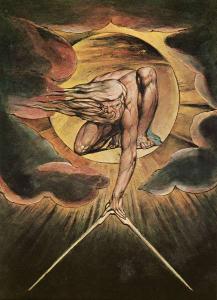
As we have just hinted, one of the reasons for selecting the Axial Threshold for special attention is that sages and seers in diverse parts of the world at that time claimed to have experienced transcendent reality, ultimate reality.
Nothing short of ultimate reality counts as divine in the post-axial spiritual quest. “Only if God is ultimate reality;” writes theologian Paul Tillich. “Only then can [God] be the object of surrender, obedience, and assent. Faith in anything which has only preliminary reality is idolatrous” (Tillich, 1955, 59). Attention to the experience of transcendence raises the God question because it raises the question of ultimacy.
The big historian does not routinely ask the question of ultimacy, let alone the God question. The big historian is comfortable ignoring the transcendental experience within the history of human consciousness. When we turn to what I dub cosmic history, we include within history the human experience of transcendence. The transcendental experience becomes data studied by the cosmic historian, even if it may be ignored by the big historian.
Science, Materialism, and Naturalism
Recall from a previous post how big historian David Blanks presupposes naturalism.
“My presupposition is that all religious, spiritual and occult beliefs and experiences are natural – not supernatural – and that this is the sense in which they should be investigated” (Gustafson, Lowell; Barry Rodrique, and David Blanks, eds 2023, 14).
Here’s the good news. Big historians are flexible. They are willing to reconsider their list of thresholds. Gregg Henriques at James Madison University together with Tyler Volk at New York University have just proposed a combogenetic model for identifying thresholds crossed in the evolution of complexity. Abbreviated PVSR dynamics, they ask us to identify those evolutionary processes characterized by four principles: Propagation, Variation, Selection, and Retention. The PVSR model adds a layer of detail to Charles Darwin’s theory of evolutionary biology: variation in inheritance acted on by natural selection (Henriques 2023).
Here’s the not so good news. No criterion for leaps in consciousness even gets considered in such a discussion.
Because big historians think of themselves as scientific, the history they construct usually focuses on energy flows, natural processes, and the way nature has influenced human political or social organization. Like other scientists, the scholarly method of big historians is tacitly materialistic and naturalistic. When tacit assumptions become a dogmatic door refusing admittance to the religious dimension, then it becomes problematic.
Materialism makes the assumption that our reality is made up matter and energy–that is, the only reality to be investigated is material reality.
Naturalism is the assumption that all reality is natural, only natural. No supernatural or supranatural (to be supranatural is to be above nature) dimension to reality exists or, if it does exist, it does not count in scientific measurements. Like other scientists, big historians look at what is physical, not what is metaphysical.
Recall from a previous post this point: scientific research alone does not justify any form of naturalism let alone any form of materialism. Science alone does not justify any …ism. Why? Because, as Patheos columnist James McGrath avers, “Experimental science is not set up to answer big questions, but very small ones.” Someone other than the scientist needs to ask big questions, such as the God question.
If we are going to ask the God question, then we must supplement what materialistic or naturalistic big historians ordinarily do.
From Materialism and Naturalism to Ultimacy and Transcendence
Can we give a strictly materialist or naturalist account of the history of everything without mentioning God? Or does the very investigation into the chronicle of natural and human events require that we raise the question of transcendence, the question to which God is the answer?
The history of human consciousness includes the rise in awareness of transcendence. “[The human person], in his knowledge of himself, does not know himself only as a world-immanent existent, but also as existing in openness toward transcendental reality,” says my favorite philosopher of history Eric Voegelin (Voegelin, 1956-1987, 3:363). The God question is built into post-axial human awareness and arises poignantly and inescapably when studying history.
Conclusion
I recommend that we tell the cosmic story as big historians would tell it, but with more. We should begin with Big Bang and follow the story through evolution into human history, to be sure. This is the route already followed by the Big History Project.
When we get to human history, however, we should look for two related developments, namely, the ways in which nature influenced the direction of human events plus the direction determined by differentiating human consciousness. In human consciousness we will see how certain sensibilities structured various symbol systems, symbol systems which admitted awareness of the divine. We will also sit stunned at the dramatic impact of the Axial Threshold crossed by our ancestors.
Can we justify telling a cosmic story in which all things are oriented to the ultimate God of grace?
Patheos SR 5055 BH 5 The God Question in Cosmic History
For more on our analysis of Big History, start clicking.
Patheos SR 5051 BH 1 Science, Religion, and Deep Time
Patheos SR 5052 BH 2 Science and Religion in Big History
Patheos SR 5053 BH 3 Teilhard and Big History
Patheos SR 5054 BH 4 What is history in Big History?
Patheos SR 5055 BH 5 God in Cosmic History
Patheos SR 5058 BH 8 Big History, Religious Naturalism, and Ursula Goodenough
Patheos SR 5060 BH 10 Critique of Ted Peters by Mitchell Diamond
Patheos SR 5061 BH11 Trinitarian Big History: Chris Barrigar
▓
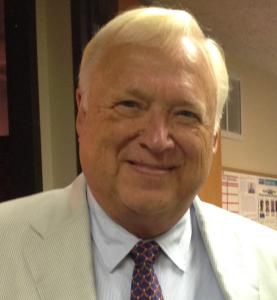
Ted Peters pursues Public Theology at the intersection of science, religion, ethics, and public policy. Peters is an emeritus professor at the Graduate Theological Union, where he co-edits the journal, Theology and Science, on behalf of the Center for Theology and the Natural Sciences, in Berkeley, California, USA. His book, God in Cosmic History, traces the rise of the Axial religions 2500 years ago. He tackled the implications of genetic innovation for the future of humanity in Playing God? Genetic Determinism and Human Freedom? (Routledge, 2nd ed., 2002) as well as For the Love of Children: Genetic Technology and the Future of the Family (Westminster/John Knox 1997). His essays are collected in Science, Theology, and Ethics (Ashgate 2003) The Voice of Public Theology (ATF 2023).
Recently Ted edited AI and IA: Utopia or Extinction? (ATF 2019). Along with Arvin Gouw and Brian Patrick Green, he co-edited the new book, Religious Transhumanism and Its Critics hot off the press (Roman and Littlefield/Lexington, 2022). His fictional spy thriller, Cyrus Twelve, follows the twists and turns of a transhumanist plot.
Visit Ted Peters’ website, TedsTimelyTake.com.
▓
References
Armstrong, K. (1993). A History of God. New York: Knopf.
Gustafson, Lowell; Barry Rodrique, and David Blanks, eds. (2023). Science, Religion, and Deep Time. London: Routledge.
Henriques, Gregg, and Tyler Volk, (2023). “Toward a Big History 2.0: A brief position paper.” Journal of Big History 6:3:1-4.
Jaspers, K. (1953). The Origin and Goal of History. London: Routledge.
Peters, T. (2017). God in Cosmic History: Where Science and Big History Meet Religion. Winona MN: Anselm Academic ISBN 978-1-59982-813-8.
Tillich, P. (1955). Biblical Religion and the Search for Ultimate Reality. Chicago: University of Chicago Press.
Voegelin, E. (1956-1987). Order and History, 5 Volumes. Baton Rouge LA: Louisiana State University Press.




